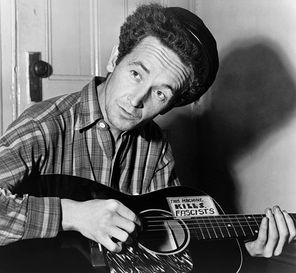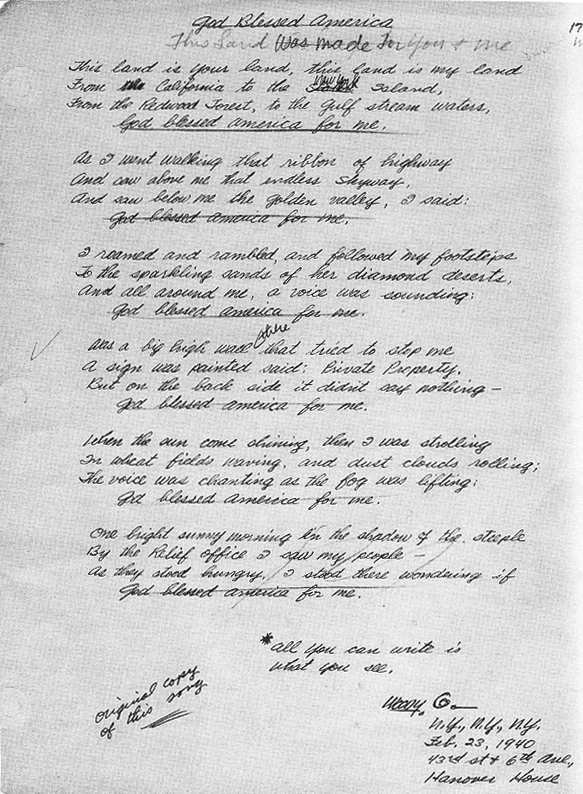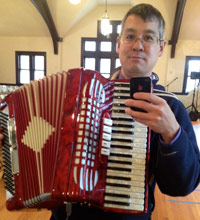 Happy birthday, Woody! Happy birthday, Woody! To mark the centennial anniversary of Woody Guthrie's birthday, Newton's own Tom Ashbrook recently devoted an hour of his On Point show on WBUR to an examination of the importance of Guthrie's "This Land Is Your Land:" Woody Guthrie wrote “This Land is Your Land” in a nothing-special hotel in New York, in the middle of writing a bunch of other songs. Wrote it longhand in a child’s school composition notebook. It sat in that notebook for years. It’s not clear he thought much of it... But it got out, into school songbooks around the country. And took off, like a second national anthem. The podcast traces the fascinating history of this iconic song, how it was sanitized for school kids in the 1950's by the removal of the "secret" verses, so as not to offend the sensibilities of the anti-communists that dominated the discourse at the time. Here are the verses that don't appear in most elementary school songbooks:
Listen to Gutherie’s original recording: While the “schoolhouse” version of the song still maintained the verses that celebrated the beauty of the country, in Guthrie’s plainspoken poetry, it clearly didn’t communicate the nuanced view that Guthrie had of the America he had seen up close, “From California to the New York Island.” As a traveling minstrel, Guthrie criss-crossed America during the 193o’s and 1940’s and saw both the grandeur and the injustice that made America such a contradictory and complex country, a country full of promise and problems, one that Guthrie loved dearly, and was still yet to fulfill the promise of its founding principles. Roots Interestingly, Guthrie lifted the melody and chord progression directly from The Carter Family’s “When the World’s On Fire,” This practice reflects an age-0ld tradition where folk music literally belongs to the people, and anyone can take a song and make it new by writing new lyrics to make it current again. Hard to believe that, in this age of copyright lawsuits, when people are sued for thousands of dollars if they dare to download a copy of a song they like, that a musician like Guthrie would encourage others to take his music and update his lyrics to their own use, the way he did with the original Carter Family tune, and in fact the way every musician before him and since crafts songs by drawing on a tradition of music and a wellspring of songs and melodies that their musical predecessors have given the world. Hidden in Plain Sight It’s fascinating to hear how Guthrie’s work was kept alive and vital through the work of his son, Arlo, and his protogee, Pete Seeger, as they both continued to sing Woody’s songs to audiences that never had a chance to hear Woody Guthrie sing them himself. Even as Pete Seeger was driven out of the “mainstream media” in the 1950’s by the same clique of anti-communists that found the sentiments of Guthrie’s “secret verses” intolerable, he continue to sing to school kids, churches, and union halls, keeping the song alive in its full form, a reminder that, even if you can’t play your music on the TV or the radio, no one can stop you from picking up your guitar and joining your voices in harmony wherever people may gather and meet. At the same time, millions of kids sang the “safe” version of Guthrie’s song in schools across the country, so the strains of the melody would be forever embedded in their unconscious, ready for the time when the whole song, all the verses, could be sung aloud, still ringing with meaning and relevance. For now, almost 80 years after Woody Guthrie first wrote the words to “This Land is Your Land” in his neat, precise penmanship, we face many of the same problems that he knew from firsthand experience: massive disparities between the rich and the poor, a financial and political system that serve the interests of a narrow elite, increasing hardship and suffering for the majority of Americans while a few gorge themselves on power and privilege, and a sense that the country has perhaps lost its way, lost sight of the ideals that animated our rise from a few tenuous colonies on the edge of a vast and mysterious wilderness to a world-spanning colossus that espoused freedom and democracy as an antidote to tyranny and oppression. His lyrics still ring true today, reminding us how much work still remains for us to reach those lofty goals, yet how much hope and beauty we can find just by looking out to our “endless skyway.” Guthrie understood that the people of this country, be they poor, hungry, dispossessed, are still the greatest strength and hope, that our freedom to savor the splendor of our nation connects us to the country’s founding principles, and protects us still from the tyranny of unchecked power and wealth: “Nobody living can ever stop me, / As I go walking that freedom highway.” For this reason, Guthrie’s song remains an anthem that’s just as relevant today as it was when he wrote it on February 23, 1940, a song of protest and solidarity for every American who longs for a day when words like “freedom and justice for all” are more than just a far off ideal or a fairy tale from a history book. Some Other Versions You May Enjoy Guest Tom Morello, guitarist from Rage Against the Machine, sings This Land and strums his acoustic, as he does at many Occupy rallies across the nation (warning: contains naughty words): Springsteen, in the middle of the Reagan years, sings a poignant version at the height of his career: Pete Seeger and Springsteen, in Washington DC, sing all the verses, with everyone helping out: To hear many other Woody Guthrie songs, with others from the American songbook, join us on May 6 at our spring concert.
0 Comments
Leave a Reply. |
AuthorJack Cheng directs the Clemente Course in Dorchester, excavates in the Middle East, and writes in Waban, MA. Archives
October 2019
Categories |



 RSS Feed
RSS Feed
